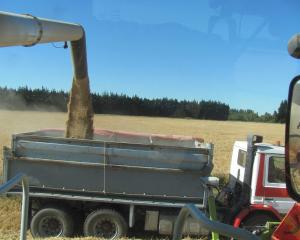Dr Barrie Wills, who was a Central Otago district councillor, says the Otago Regional Council’s transport plan should be amended to add a "simple" set of rules to address the issue.
But the regional council says rather than enforcement, the best mechanism for reducing effluent spillage is good practice from farmers and stock truck companies.
Trails of "green gunk" on highways and through local towns over the past several weeks were a result of stock trucks moving dairy cows south from winter grazing in Central Otago, said Dr Wills, who is the principal consultant at Central Environmental Services.
"This concentrated effluent ends up polluting our waterways and creates a slippery, dangerous surface on our highways."
He suggested a set of rules to be enforced to avoid spillage.
"Dairy stock must be stood off green feed for 10 to 12 hours prior to transport, and stock trucking firms need to ensure their trucks have tanks and their drivers utilise available stock-truck effluent-disposal sites, starting journeys with empty tanks."
Dr Wills said that while he was the Central Otago District Council’s roading committee chairman, it succeeded in getting one stock-truck effluent-disposal site on State Highway 85 at Brassknocker Rd.
The regional council had also proposed placing a second site on the Ripponvale straight just along from Highlands Motorsport Park and next to several horticultural properties, but the district council told the regional council a facility at that site would have negative effects and its preference for the second one was near Tarras.
Regional council operations general manager Gavin Palmer said it awarded contracts for construction of the site near Tarras in June, and work would begin this week.
Farmers and stock truck companies should adhere to good practice around standing stock, fitting effluent tanks and using the network of effluent disposal sites around Otago and Southland, he said.
The council had built eight of them around the region. They were maintained by territorial authorities, except for the two sites in Central Otago, at Raes Junction and Brassknocker Rd, which the regional council maintained, he said.
Dr Palmer agreed it was important to keep effluent from spilling on to roads.
"As well as being smelly and unsightly, it can contaminate land waterways, it poses potential health risks, and it can be a road safety hazard."















